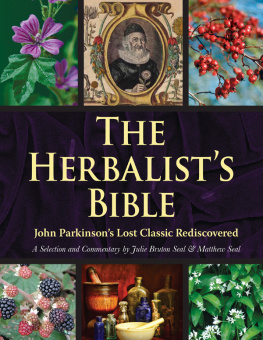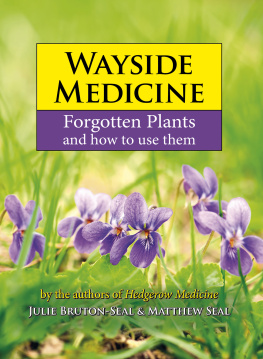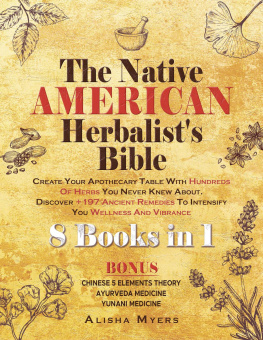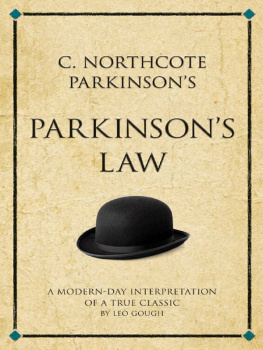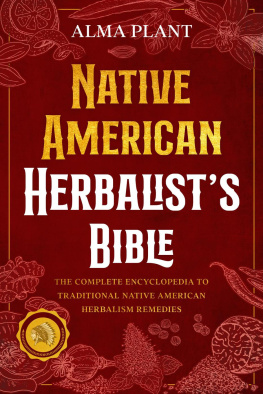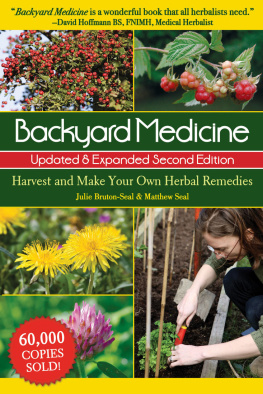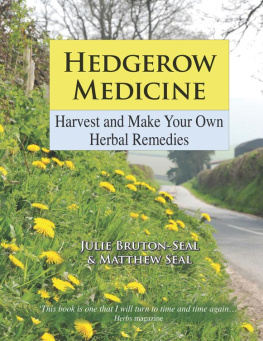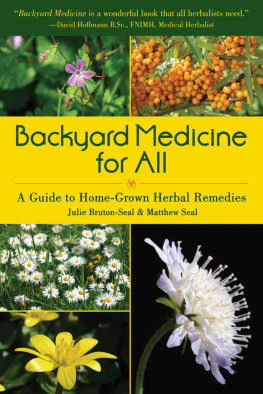
Copyright 2014 by Julie Bruton-Seal and Matthew Seal
First published in the United Kingdom by Merlin Unwin Books Limited. This USA Edition of
The Herbalists Bible is published by arrangement with Merlin Unwin Books Limited.
All rights reserved. No part of this book may be reproduced in any manner without the express written consent of the publisher, except in the case of brief excerpts in critical reviews or articles. All inquiries should be addressed to Skyhorse Publishing, 307 West 36th Street, 11th Floor, New York, NY 10018.
Skyhorse Publishing books may be purchased in bulk at special discounts for sales promotion, corporate gifts, fund-raising, or educational purposes. Special editions can also be created to specifications. For details, contact the Special Sales Department, Skyhorse Publishing, 307 West 36th Street, 11th Floor, New York, NY 10018 or .
Skyhorse and Skyhorse Publishing are registered trademarks of Skyhorse Publishing, Inc., a Delaware corporation.
Visit our website at www.skyhorsepublishing.com.
10 9 8 7 6 5 4 3 2 1
Library of Congress Cataloging-in-Publication Data is available on file.
Designed and typeset in Adobe Caslon Pro Regular (Parkinsons text) and Helvetica Neue Light (commentary) by Julie Bruton-Seal and Matthew Seal
Photographs by Julie Bruton-Seal, unless otherwise stated
Cover design and endpapers by Merlin Unwin
ISBN: 978-1-62914-694-2
Ebook ISBN: 978-1-62914-983-7
Printed in China
Please note:
The information in The Herbalists Bible is compiled from a blend of historical and modern scientific sources and from personal experience. It is not intended to replace the professional advice and care of a qualified herbal or medical practitioner. Do not attempt to self-diagnose or self-prescribe for serious long-term problems without first consulting a qualified professional. Heed the cautions given, and if already taking prescribed medicines or if you are pregnant, seek professional advice before using herbal remedies.
C ONTENTS
Dedicated to
JOHN PARKINSON
(15671650)
Writer, gardener, herbalist, botanist, apothecary

Phoebus hath fifty times lasht through the signes ,
Since thou intendst this Iubilee of lines.
And now tis extant; and shall swiftly scoure
Through darke oblivion to the worlds last houre....
Keepe thy Hesperides ; may thy herbes with thee
Still bloome; by Prester never blasted bee.
And seeing by thy hands the day is wonne,
No night of Age shall cloude bright Parke-in-sunne.
John Harmer, Oxford
(writing in the preliminary pages of Theatrum Botanicum , 1640)

Worthy sir,
You have built us a Botanicke Theater; with such excellent skill and advantage to the Spectator; that at one view he commands the prospect of both Hemisphers; and all their vegetables in the pride of beauty: ranged in their proper orders, decking the Hils, Plaines, Valleyes, Medowes, Woods, and Bankes, with such a world of shapes and colours, so delightfull to the eye, so winning upon the rationall Soule which feeds on rarities! that we cannot hope for a more compleate Paradise upon earth, till Nature have found out a new stocke for more variety; what can be added to this I see not; nor is it (I beleeve) yet knowne to the best of Artists that have made search.
John Speed, Med.D., Oxon
(writing in the preliminary pages of Theatrum Botanicum , 1640)
right : John Parkinsons dedication to King Charles I of his Manlike Worke of Herbes and Plants, in Theatrum Botanicum , 1640. He had become the royal herbalist a few months before publication

P REFACE
Our connection with John Parkinson began in late 2005 when we first saw a copy of his Theatrum Botanicum (1640) in the Collection of Rare Botanical Books at the John Innes Foundation in Norwich. It was our good luck to have found a collection of old botanical and herbal books within four miles of where we were living, and we made full use of it.
The book itself was a huge folio of 1,788 pages of illustrated text, with a sturdy leather cover, and weighing in at 11 lb (5 kg). It is not a book to be treated lightly, in any sense of the word. We did hear that some twenty or thirty years previously the book could then be borrowed from the open shelves of the John Innes Library, and that one person cycled home with a copy in an open rucksack on his back, later returning it complete with rain spatters.
Such old volumes were being treated with rather more care by the time we visited, with climate control and close supervision. Indeed, Theatrum now had the status and charisma of a rare book, the original edition of 1640 never having been reprinted.
Open its first few pages and you find the descriptive title page, in the 17th century manner, with some 180 words describing this herball of a large extent. It is actually the biggest herbal ever to be published in English, so Parkinson didnt over-sell himself here.
Opposite the title is a frontispiece (which we reproduce in a hand-coloured version) by the engraver William Marshall, with central panels showing Adam as the original gardener, with a spade, and Solomon, the wise authority, with a crown and sceptre. At the four corners are four naked ladies from different continents who are riding on appropriate steeds and surrounded by native plants.
But what hits the eye among this careful mythology is the inset likeness at the foot of the page of John Parkinson himself, aged 73. He has short hair under an apothecarys skullcap and is dressed dourly in black, with a plain ruff, and holding a thistle. He is slender in build, unsmiling, somewhat tired and lightly beardedand looks uncannily like Julies father!
Three excellent indexes (of Latin names, English names and vertues, or medicinal uses) help you navigate his vast tome. But open it at any page, or look at random at the e-book. You can hardly fail to be impressed by the depth of knowledge on display, expressed calmly and with quiet dignity in supple but practical prose (while Parkinson preferred Latin titles for his books he always wrote in English). This is no mere book of spells, a grimoire, or quaint folklore, you realize; in its descriptions of some 3,800 plants and their names but especially in the vertues, this is a book of living herbalism from a time when herbs were orthodox medicine.
All but forgotten from the 18th to the 20th centuries, with a few passionate defenders and accusers to keep its memory alive, the book has taken on a new life in the twenty-first. Theatrum now has an online presence (though we still prefer to navigate the physical book), and since 2007 John Parkinson now has a biography, for the first time, written by the journalist, BBC producer and probable descendant, Anna Parkinson. Anna has made her own journey with Parkinson, and at this point we would like to express our appreciation of her thorough and fruitful research, which we draw on here with her permission.

